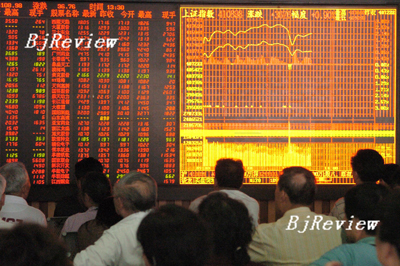
Ten years ago, a financial crisis stormed through Asia, shaking the very foundations of the regional economy. At the 10th anniversary of the financial catastrophe, Asian economies are prosperous once again. They can boast incredible, rapid development, along with large-scale inflows of international capital.
China was one of the few countries to dodge the crisis a decade ago. "[This was largely] because the Chinese currency-yuan-was not convertible, and the capital account was controlled by the government," said Zhao Xijun, Associate Dean of School of Finance, Renmin University of China.
The UN has recently warned that Asia is again vulnerable to financial meltdown. This dire news comes from a report released by the UN Economic and Social Commission for Asia and the Pacific in mid-April.
The world has shifted its attention to China because of its breathtaking economic performance. Its markets are targeted by enormous amounts of international hot money under the expectation that the currency will appreciate further in the near future. Behind the scenes, international speculators have helped push the benchmark Shanghai Composite Index to record highs, reaching 3776 points on June 6, more than triple of what it stood at in mid-2005.
All this puts China in a bind. How is it to maintain rapid economic growth and simultaneously eradicate poverty, while at the same time minimize the threats and a possible crisis brought about by fast-developing financial markets?
Crisis in retrospect
The financial unrest a decade ago started when Thailand was forced to drop its fixed exchange rate and let it float in July 1997, a decision that led to a sharp depreciation in the Thai baht. The depreciation flu soon plagued all of East Asia. Thailand, Indonesia and South Korea were hit the hardest.
George Soros, the controversial American financier and philanthropist, has been branded as a major culprit of the crisis, as he and other monetary speculators led a stampede in selling Asian currencies, reversing the course of the flourishing regional economies.
Amid wide suspicion in the Western media that China would be forced to devalue its currency to guarantee export competitiveness, China held firm, pegging its currency to the U.S. dollar at a ratio of 8.3 to 1.
The latest UN report praised China's stance during the crisis. "China's role in maintaining its currency and providing a stable source of demand was critical; its strong and consistent growth since then has been a main driver of the region's rapid recovery," concluded the report.
China's transformation in the past decade has seen it evolve into the fourth largest economy in the world, the third largest trader, and one of the world's fastest growing economies. Its GDP grew at a staggering 11.1 percent in the first quarter this year, and the growth rate has exceeded 10 percent year on year since 2004. The average growth rate from 1979 to 2004 was 9.6 percent.
"China has undergone ‘earth-shaking' changes," Zhao commented.
The Chinese stock market is blossoming amid short-term turbulence. The total market value of the Shanghai and Shenzhen stock exchanges amounted to 17 billion yuan by the closing bell on June 1 this year.
But in 1997, the Shanghai stock market was still functioning on a trial basis under the planned economy. "We will see how it performs," said former Chinese leader Deng Xiaoping in 1997. "We can shut it if it doesn't do well."
Zhao was among the first group of individual investors in the Shanghai stock market when it opened in 1990. At that time under the planned economy the idea of a stock market was tantamount to something dreadfully monstrous. Company assets were mostly state-owned and stock trading before 1998 was nominal.
The legal status of the stock market was established in 1998, when the Securities Law of China took effect.
The banking industry has witnessed a face-lift too.
The non-performing assets of the major Chinese state-owned banks have been appropriately disposed of and transformed into joint-stock companies, listed both on overseas and domestic stock markets. Most of them are considered blue chip companies, like Bank of China and the Industrial and Commercial Bank of China, and have reaped enormous profits for their investors.
Meanwhile, the banks are able to make loans free from government administrative orders. Just 10 years ago, bank loans were under the thumb of the government.
All about currency
During the past 10 years the Chinese financial industry has been transformed and most of the financial sectors, like banking and insurance, have been opened to foreign companies according to China's WTO commitments.
However, in terms of currency convertibility and capital accounts, China has been cautious and firm. Amid disputes that the Chinese financial development trend resembles that of East Asia before the 1997-98 crisis, "China is less likely to encounter a so-called crisis," said Zhao. "The capital account is still under strict control of the government and the renminbi is still not convertible."
| 